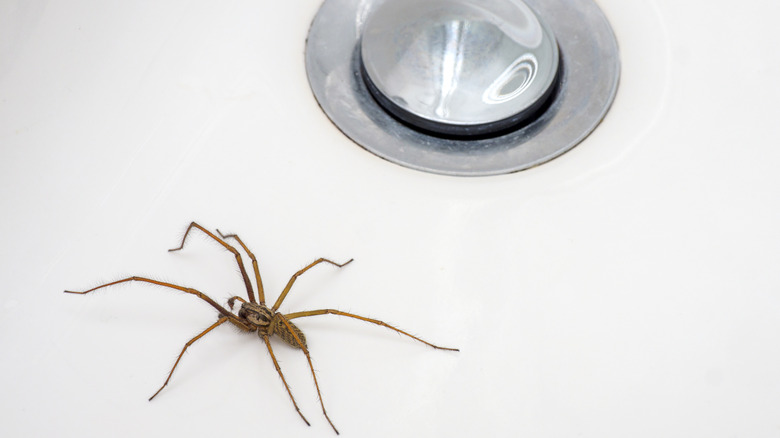Why The Spiders You Get Rid Of Keep Showing Back Up
You finally mustered the courage to trap that spider and toss it outside. You even made sure to walk a few steps from the porch before doing so. And yet, a week later, it's back again with its smug crawl across your living room wall. It almost feels personal at this point. But what you need to realize is that spiders are territorial creatures. When you relocate them a few feet away, you're basically giving them a scenic detour right back home. They will seek shade (bringing them right back to your house, most likely) and can recognize the same cozy nooks that made your place feel like paradise in the first place. Put simply, they keep showing up because you're probably releasing them somewhere close to your building.
The National Wildlife Federation shares that the common house spider is the most frequent arachnid guest in American homes. It barely reaches a quarter inch in size and loves to hide in low-traffic areas like behind appliances, under staircases, in crawl spaces, and basements. Though harmless, it isn't exactly the roommate you'd like to see in your place. The brown recluse is another familiar face, and among the spiders you absolutely do not want to find in your home. Their venom contains potent toxins that can trigger severe reactions in people, from muscle pain to tissue damage around the bite. Once you spot them in or around your property, you'll want to get rid of them immediately because they multiply fast. A few spiders today can turn into dozens before you know it.
Ways to stop spiders from making a comeback
First things first: distance matters. If you're relocating a spider, consider tossing it far, far away from your property. Across the street or near a wooded area will do. A smarter option, though, is to vacuum them up. You can then dispose of the bag well away from your home. It's faster and a relatively clean way to keep spiders from invading your home.
Also, it's best to avoid squishing them. While it may seem satisfying in the moment, there's a creepy truth to why you shouldn't. A few species carry their babies on their backs. Crushing them can release dozens of tiny spiders. So, instead of solving your problem, you'll end up multiplying it.
Further, take a thorough walk around your home to identify potential spider spots. Check ceiling corners, behind the furniture, window sills, basements, garages, essentially anywhere dusty or forgotten. Clear out any webs that you spot. When the webs are gone, spiders are less likely to stick around. After that, look for gaps or torn screens around windows and doors. Spiders love easy entry points, so make sure you seal them tight to keep spiders away from your home.
Finally, keep things tidy outside too. If there's vegetation hugging your walls, keep it trimmed. In the case of an infestation, consider relocating it at least 8 feet from your structure. Rake up fallen leaves or debris, as well. The fewer hideouts spiders have outside, the less likely you are to be surprised by one that accidentally wandered inside.

